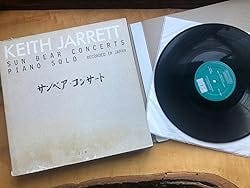People are intimidated by large works of art. Long books and box record sets seem daunting in their demand on our time and attention. But I think it's important to realize that these are merely multiple modules assembled into a larger whole and we can take our time in experiencing and assimilating them. The time one devotes to a piece of art pays dividends in the ability to experience new depths of feeling and in sharpening our ability to focus and pay sustained attention to ideas. That's an important human component that is largely lost in a world that values the short, sharp, and shocking.
Setting aside a year to read, say, Ulysses or Moby Dick or Gravity's Rainbow is not dissimilar to the practice of binge watching a streaming series. People already devote time to reading lengthy serial books like Game of Thrones and the Harry Potter books.
And so in January of each year I will often devote my music listening time to one lengthy recording and not much else for the month. This year I've chosen Keith Jarrett's Sun Bear Concerts. It's not the first year I've devoted January to this mammoth set. The last time was in 2019.
Sun Bear Concerts was released as a 10LP box set by ECM Records in 1978. Its sides were all recorded on a tour of Japan in November 1976 and document Jarrett's performances in Kyoto, Osaka, Nagoya, Tokyo, and Nagora. These are all-improvised performances following in the footsteps of the three record box Solo-Concerts Bremen/Lausanne (1972) and two LP classic Koln Concert (1975). Jarrett was in his early thirties and having created buzz working with Charles Lloyd and then Miles Davis, he made a name for himself with his live improvisations while at the same time he was leading a cutting edge post bop combo featuring Dewey Redman, Charlie Haden, and Paul Motian.
Clocking in at just over six and a half hours of solo piano, Sun Bear Concerts is, well, a bear. But it's a giant gift from the pianist, and I feel that I've uncovered some of its treasure in my January 2019 listen. But when listening to a monolithic piece of work such as this, I think that it it important to allow oneself a first listen that is fairly uninterrupted. Let the music flow over you, notice where you are distracted and where you are called upon to play closer attention.
I also recommend repetition. Listen to the first album or disc of your chosen epic work a few times in a row until you start to recognize a few signposts--a melody here, a chord there, maybe a tempo or mood change between sections. Go ahead and put on the second disc or section and let it play while you are doing something or just listening, but then go back and replay the first section again. Not only do you start to recognize the sections, but you start to get a sense of the whole sweeping work.
As you might guess, this process takes time, which is something we feel like there is less of as the year progresses, which is why I set aside my listening time in January. This raises another point. This is not a contest. No one expects you to hear and apprehend something like Sun Bear Concerts or Bach's complete organ works or a Glass opera all at one go. No one cares, and you won't get a reward, either. So relax. Take your time. I made progress on Sun Bear in 2019, but I just got started. In fact, I didn't listen to the last two concerts at all.
Jarrett didn't start out playing solo piano concerts. In a 2000 interview with Terry Gross he remembered the genesis of the solo concerts this way: "It started out maybe as a result of recording 'Facing You', I can’t remember...I came out and did a solo thing. And it was tunes, but I started to connect them somehow. Like, I’d have these transitional parts that connected everything. And then that somehow just moved slowly into the expanded solo concert, where there are no songs whatsoever and everything is improvised on the spot."
Part of the fun of listening to Jarrett's solo concerts is trying to pay attention through the transition from one section or mood to another. Often I'll find myself lost in thought or following the lines he's playing and I realize that the tempo has slowed tremendously, or that he is suddenly playing serial composition or has gone completely atonal and outside, or that he's now doing a stride piano thing. It's a lot like meditating--your mind is continuously brought back to focus on what is being played, following the pianist/composer's twists and turns, only to find that once again you're daydreaming.
One reason I love listening to solo piano records, and to Jarrett in particular, is that it provides me with perspective. The musician is on a meditative journey, you're on a journey through your thoughts and your reactions to the music based on what is happening in your nervous system right now, as you listen. You can, of course, experience this with any music, or with no music at all. Perhaps because I studied piano for a formative part of my life I associate solo piano music with an inner monologue, it feeds my stream of consciousness just like a poem or a film or a great work of visual art.
In the liner notes to his Concerts: Bremen/Lausanne, Jarrett wrote: "I don’t believe I can create, but that I can be a channel for the Creative. I do believe in the Creator, and so in reality this is his album through me to you, with as little in between as possible on this media-conscious earth." That trope, that the artist merely acts as a conduit of the divine, the ecstatic experience, is universal from Homer to Shakespeare to Beethoven. The solo performance is meant as a direct communication from the artist to the listener.
Channeling the universe, there are of course going to be times when the signal goes a little weak. At that time the artist may go into a holding pattern or resort to a familiar vibe while waiting to catch the next wave. Listening now to Tokyo November 14, 1976 (Part 1) it seems as though Jarrett begins by searching, reaching for something that seems to elude him until, around the ten minute mark, he unleashes a series of five note phrases that becomes the ostinato that signals that the train is about to leave the station. What's ten minutes of searching in a forty minute improvisation?
I would love to hear about readers' encounters with lengthy recorded works, boxed sets, and the like. What epic recordings have you listened to and what approach did you take?
New Directions in Music is written by a single real person. It is not generated by AI. Please help spread good content by reading (Thank you!) and sharing this post with a music loving friend. If you like what you see, please sign up for a free subscription so you don’t miss a thing, or sign up for a paid subscription if you can.




Wagner is a trip I need to take soon. I've seen quite a few opera productions over the years, but the only Wagner I've tackled is 'Die Meistersinger.' Perhaps next January!
This is a wonderful January activity (I might just try it). While I haven't done a concentrated immersion of one work such as you did, I really do enjoy lengthy box sets. I'm actually mid-way through Mosaic records "Classic Jazz at the Philharmonic Jam Sessions,1950-1957," the ten-CD set that Mosaic issued last year. Just great music!